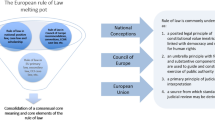Abstract
Some of Law and Economics’ pivotal claims have come to be criticized as a result of empirical findings that question their viability. Particularly, the premise that agents consistently act rationally and with their self-interest in mind seems problematic. What the consequences of the criticism mean for Law and Economics’ tenability depends largely on the questions whether (1) some elements are unassailable to the alternative’s objections and (2) the alternative is a systematic whole. It is argued that Law and Economics may be salvaged, if it is minimized and its ambitions are tempered. This means focusing on the stable, a priori, elements inherent to it.
Similar content being viewed by others
References
Armor A., Taylor S.: When predictions fail: the dilemma of unrealistic optimism. In: Gilovich, Th., Griffin, D., Kahneman, D. (eds) Heuristics and Biases. The Psychology of Intuitive Judgment, pp. 334–347. Cambridge University Press, Cambridge (2002)
Bacon, F.: Novum Organum [1620]. In: Rees, G., Wakely, M. (eds.) The Instauratio magna. Part II: Novum Organum and Associated Texts. Summary of the second part, digested in aphorisms: aphorisms concerning the interpretation of Nature, and of the kingdom of man. Oxford University Press, Oxford (2004)
Baker L., Emery R.: When every relationship is above average. Law Hum. Behav. 17(4), 439–450 (1993)
Becker G.: The Economic Approach to Human Behavior. The University of Chicago Press, Chicago (1976)
Becker G.: The economic way of looking at behavior. J. Polit. Econ. 101(3), 385–409 (1993)
Bentham J.: An introduction to the principles of morals and legislation [1789]. In: Browning, J. (ed) The Works of Jeremy Bentham, vol. 1, Russell & Russell, New York (1962)
Brenner L., Koehler D., Rottenstreich Y.: Remarks on support theory: recent advances and future directions. In: Gilovich, Th., Griffin, D., Kahneman, D. (eds) Heuristics and Biases. The Psychology of Intuitive Judgment, pp. 489–509. Cambridge University Press, Cambridge (2002)
Calabresi G.: Some thoughts on risk distribution and the law of torts. Yale Law J. 70(4), 499–553 (1961)
Calabresi G.: Does the fault system optimally control primary accident costs?. Law Contemp. Probl. 33(3), 429–463 (1968)
Calabresi G.: The Costs of Accidents. Yale University Press, New Haven (1970)
Doomen J.: Smith’s Analysis of Human Actions. Ethica: Int. J. Moral Philos. 4(2), 111–122 (2005)
Etzioni A.: The Moral Dimension. Towards a New Economics. The Free Press, London (1988)
Etzioni A.: The New Golden Rule. Community in a Democratic Society. Basic Books, New York (1996)
Fischhoff B.: For those condemned to study the past: heuristics and biases in hindsight. In: Kahneman, D., Slovic, P., Tversky, A. (eds) Judgment Under Uncertainty: Heuristics and Biases, pp. 335–351. Cambridge University Press, Cambridge (1982)
Gregersen H., Sailer L.: Chaos theory and its implications for social science research. Hum. Relat. 46(7), 777–802 (1993)
Hayward T., Preston J.: Chaos theory, economics and information: the implications for strategic decision-making. J. Inform. Sci. 25(3), 173–182 (1999)
Hobbes, Th.: Leviathan [1651] (Tuck, R. (ed.)). Cambridge University Press, Cambridge (2007)
Jolls C., Sunstein C., Thaler R.: A behavioral approach to law and economics. Stanford Law Rev. 50(5), 1471–1550 (1998)
Korobkin R.: Possibility and plausibility in law and economics. Fla State Univ. Law Rev. 32(2), 781–795 (2005)
Korobkin R., Ulen Th.: Law and behavioral science: removing the rationality assumption from law and economics. Calif. Law Rev. 88(4), 1051–1144 (2000)
Landes W., Posner R.: The Economic Structure of Tort Law. Harvard University Press, Cambridge (1987)
Llewellyn K.: Jurisprudence. Realism in Theory and Practice. University of Chicago Press, Chicago (1962)
Popper K.: The logic of scientific discovery. Hutchinson, London (1962)
Posner R.: A theory of negligence. J. Leg. Stud. 1(1), 29–96 (1972)
Posner R.: Strict liability: a comment. J. Leg. Stud. 2(1), 205–221 (1973)
Posner R.: The law and economics movement. AEA Pap. Proc. 77(2), 1–13 (2001)
Posner R.: Economic Analysis of Law. Aspen, New York (2003)
Ricardo, D.: On the Principles of Political Economy and Taxation [1817]. The Works and Correspondence of David Ricardo, vol. 1. Cambridge University Press, Cambridge (1951)
Rosser J. B. Jr.: Chaos theory and rationality in economics. In: Douglas Kiel, L., Elliott, E. (eds) Chaos Theory in the Social Sciences. Foundations and Applications, pp. 199–213. University of Michigan Press, Ann Arbor (1999)
Shavell S.: Strict liability versus negligence. J. Leg. Stud. 9(1), 1–25 (1980)
Shavell S.: Economic Analysis of Accident Law. Harvard University Press, Cambridge (1987)
Simon H.: Reason in Human Affairs. Stanford University Press, Stanford (1983)
Slovic P., Fischhoff B., Lichtenstein S.: Facts versus fears: understanding perceived risk. In: Kahneman, D., Slovic, P., Tversky, A. (eds) Judgment Under Uncertainty: Heuristics And Biases, pp. 463–489. Cambridge University Press, Cambridge (1982)
Tversky A., Kahneman D.: Judgment under uncertainty: heuristics and biases. In: Kahneman, D., Slovic, P., Tversky, A. (eds) Judgment Under Uncertainty: Heuristics And Biases, pp. 3–20. Cambridge University Press, Cambridge (1982a)
Tversky A., Kahneman D.: Availability: a heuristic for judging frequency and probability. In: Kahneman, D., Slovic, P., Tversky, A. (eds) Judgment Under Uncertainty: Heuristics And Biases, pp. 163–178. Cambridge University Press, Cambridge (1982b)
Ulen Th.: The growing pains of behavioral law and economics. Vanderbilt Law Rev. 51, 1747–1763 (1998)
Vaihinger H.: Die Philosophie des Als Ob. Felix Meiner, Leipzig (1922)
Author information
Authors and Affiliations
Corresponding author
Rights and permissions
About this article
Cite this article
Doomen, J. Salvaging law and economics. Qual Quant 47, 1943–1956 (2013). https://doi.org/10.1007/s11135-011-9635-6
Published:
Issue Date:
DOI: https://doi.org/10.1007/s11135-011-9635-6




